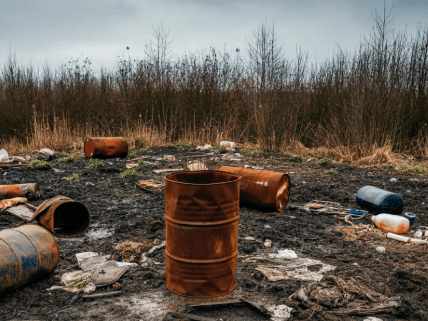Buying land with hazardous materials is a complex decision that demands careful consideration. Contaminated properties can see their value plunge by up to 40%, according to industry experts, due to the risks and cleanup costs involved. Hazardous materials like toxic chemicals or heavy metals pose significant health dangers, and any misstep could lead to legal liabilities. Steve Daria and Joleigh, widely recognized as cash land buyers and successful real estate investors, have navigated such challenges and turned them into opportunities. Whether it’s soil contamination or other environmental concerns, they emphasize the importance of due diligence, including environmental assessments, before purchasing. Understanding the risks is crucial to avoid unexpected costs and headaches if you’re considering buying land with hazardous materials. Book a free discussion today and learn how to assess these properties with expert guidance effectively!
Key Points
- Understand the Health Risks and Environmental Impact: Hazardous materials like heavy metals, pesticides, or industrial chemicals in the soil can pose serious health hazards to humans and wildlife. Properties with contamination often require extensive testing and cleanup before they become safe for use.
- Be Aware of Decreased Property Value: Contaminated land can significantly lose its market value, often making it a tough sell in the future. Buyers should anticipate reduced interest from future investors or residents due to the stigma surrounding these properties.
- Prepare for Costly Remediation Efforts: Cleaning up land contaminated with hazardous materials can be expensive and time-consuming. These costs should be considered during negotiations to better assess the true financial commitment involved.
- Understand Your Legal Liabilities: Once you purchase a contaminated property, you may inherit legal and financial responsibility for addressing the contamination. Compliance with local, state, and federal environmental regulations could further complicate the purchase.
- Conduct Thorough Environmental Due Diligence: Always conduct in-depth environmental assessments, like Phase I and II inspections, to identify contamination risks beforehand. This crucial step helps you avoid surprises and ensures informed decision-making.
What does it mean to buy land with hazardous materials?
Buying land with hazardous materials means purchasing a property that has been contaminated with harmful substances like industrial chemicals, heavy metals, or toxic waste.
These materials often come from previous land use, such as factories, fuel storage, or improper waste disposal methods.
Purchasing land contaminated with hazardous materials requires a clear understanding of the associated risks, as they have a profound effect on both human health and the environment.

Contaminated properties can also see a sharp decline in their market value, sometimes losing up to 40%, and often require expensive cleanup processes to become usable.
For example, soil contamination can affect future developments and even harm nearby water sources.
Buyers might also inherit legal responsibility for remediation once the transaction is complete, leading to unexpected financial liabilities.
Conducting detailed environmental assessments is vital to identify any contamination before making an investment.
If you’re thinking about purchasing this type of land, consulting with experts can provide valuable insights into the risks involved and guide you toward making informed, safe decisions.
Get Started: Get Your Cash Offer Below…
We are direct land buyers. There are no commissions or fees and no obligation whatsoever. Start below by sharing where your property is and where we can send your offer…
How do hazardous materials affect property value?
Hazardous materials can greatly affect property value, particularly when purchasing land that contains such materials.
Contaminated properties often lose their appeal to buyers because of their health and environmental risks.
This stigma can lead to a decline in value by as much as 40%, making the land a risky investment.
Furthermore, the costs associated with cleaning up the hazardous materials can be very high, discouraging potential buyers even more.
For instance, soil contamination might require expensive removal or treatment, adding to the total investment required.
The presence of contaminants can also limit the property’s potential use, reducing its marketability.
Buyers are often hesitant to take on such land’s legal and financial liabilities.
If you’re considering buying land with hazardous materials, it’s essential to factor in these challenges and work with experts to assess the true costs and potential.
How can I identify hazardous materials on a property?
- Perform a Phase I Environmental Site Assessment (ESA): A Phase I ESA is a standard inspection that reviews the property’s history to find potential contamination risks. It examines past land uses, nearby industrial activities, and possible sources of hazardous materials.
- Hire an Environmental Consultant: Experts can conduct in-depth investigations to detect hazardous materials like asbestos, lead, or chemical waste. They use specialized tools and knowledge to provide a detailed report on contamination levels.
- Test the Soil and Water: Soil and groundwater testing can detect harmful substances like heavy metals or industrial pollutants. These tests help determine if prior activities have left toxic residues that could be a health or environmental risk.
- Review Public Records and Environmental Databases: Check government databases and property records for any reports of contamination or environmental incidents in the area. These records offer crucial insights into potential risks, providing valuable context and background information.
- Look for Visual Signs of Contamination: Pay attention to unusual odors, oil stains, or discolored vegetation, which can indicate the presence of hazardous materials. While not conclusive, these signs often warrant further investigation by a professional.
- Check for Signs of Underground Storage Tanks (USTs): Old underground storage tanks can leak hazardous substances into the ground over time. Look for vent pipes, fill caps, or other evidence of USTs, and get a professional inspection if you suspect one is present.
- Speak with Neighbors or Local Officials: Neighbors or local officials may have information about any past activities on the property or surrounding areas that could have caused contamination. They can share important insights that you might otherwise miss.

Are there laws about buying land with hazardous materials?
Yes, some laws and regulations address buying land with hazardous materials to protect public health and the environment.
Governments have strict environmental rules requiring property owners to identify and clean up contamination.
For instance, laws like the Comprehensive Environmental Response, Compensation, and Liability Act (CERCLA) in the U.S. can hold buyers responsible for cleaning hazardous sites, even if they didn’t cause the contamination.
Many local governments also have zoning regulations restricting building activities on contaminated land.
Before purchasing, you may need to conduct environmental tests to ensure compliance with these laws.
Neglecting to follow the regulations could lead to heavy fines, liability issues, or cleanup costs after the purchase.
Working with a legal expert or consultant is a good step to ensure you understand all requirements.
By following these precautions, you can make well-informed decisions while steering clear of unforeseen financial or legal challenges.
What are the biggest risks of buying land with hazardous materials?
1. Health Risks for You and Others
Hazardous materials like toxic waste or industrial chemicals can pose serious health problems.
These substances may cause respiratory problems, skin irritation, or even pose risks to long-term health.
Living or working on contaminated land can be dangerous if the hazards are not properly managed.
2. High Cleanup Costs
Cleaning up hazardous materials can be expensive and time-consuming.
You may need to hire specialists to remove or treat contaminated soil, water, or structures.
Without proper budgeting, this can quickly become a financial burden exceeding the property’s initial purchase price.
3. Legal Liabilities
You might be held legally responsible for the contamination of the land, even if you didn’t cause it.
Laws make property owners liable for cleanup under certain conditions.
Not addressing these issues could result in lawsuits or hefty fines, adding extra stress and costs.
4. Decreased Property Value
A property with hazardous materials is often worth less because it is seen as less desirable.
The stigma of contamination can make it hard to sell or get a good price in the future.
Additionally, potential buyers may be hesitant due to health concerns and financial risks.
5. Limited Use of the Land
Contamination can restrict how you use the property, whether for building homes, farming, or other purposes.
For example, zoning laws may prevent land development with hazardous materials.
This can limit your investment’s potential and reduce the return on your purchase.
How can I start the process of buying hazardous land safely?
Starting the process of buying hazardous land safely requires careful planning and professional help.
Begin by hiring an environmental consultant to inspect the property and identify any potential hazards.
A Phase I Environmental Site Assessment (ESA) plays a crucial role in evaluating a property’s history and uncovering potential contamination risks.
Research local regulations about owning contaminated property, as these laws can affect your responsibilities.
When buying land with hazardous materials, it’s important to budget for potential cleanup costs, including soil remediation or waste removal.
Before purchasing, consult with legal and real estate experts to gain a clear and thorough understanding of your rights and responsibilities.
Always check zoning laws to ensure the land can be used as you intend, as contamination may limit development options.
Take the first step by contacting experienced professionals or real estate advisors to guide you confidently through the process.
**NOTICE: Please note that the content presented in this post is intended solely for informational and educational purposes. It should not be construed as legal or financial advice or relied upon as a replacement for consultation with a qualified attorney or CPA. For specific guidance on legal or financial matters, readers are encouraged to seek professional assistance from an attorney, CPA, or other appropriate professional regarding the subject matter.
